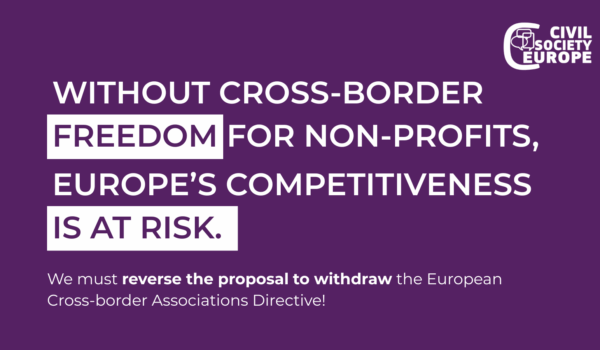Civil Society Europe’s Reaction to the Proposed Withdrawal of the European Cross-Border Associations (ECBA) Directive
On 21st October 2025, the European Commission published its Work Programme for 2026.1 Despite its commitments to support competitiveness in Europe and to strengthen the European social model, the Commission has proposed to withdraw the European Cross-Border Associations (ECBA) Directive. This follows the decision of dismantling the social economy unit in DG GROW that had worked on the proposal.
The Directive, long awaited by the civil society sector that has been calling for a European Association Status for decades, would finally allow the non-profit sector to operate across borders, providing a level playing field while being the first time that the sector would be recognised at EU level. More than 3.8 million associations2 exist in the EU, employing more than 6 million people3: this Directive could not only promote the creation of new associations, new jobs and stimulate GDP growth, strengthening the competitiveness of our continent, but also fortify a sector that provides crucial social services, a key element of our European social model.
This decision is also diametrically opposed to the Commission’s commitment to strengthen democracy and civic space via the Democracy Shield and the Civil Society Strategy: the Directive would open up new opportunities for cross-border cooperation for civil society, and will strengthen civil society resilience in Member States where civic space is more endangered.
It is true that the work on the Directive in the Council has been slowed down in the last months due to discussions over the legal basis – however, there have been no public calls for withdrawal of the Directive, nor was withdrawal among the options considered by the Council. Furthermore, this does not take into account the European Parliament’s position, which approved its position in record time and with very broad support, which is still present today.
The announcement of the withdrawal must be followed by a decision within the next six months. We urge the Executive Vice-President Séjourné and the College of Commissioners to listen to the non-profit sector and civil society: reverse this proposal. This Directive deserves a fair chance to see the light of day. This is what millions of non profit associations need and are expecting.


